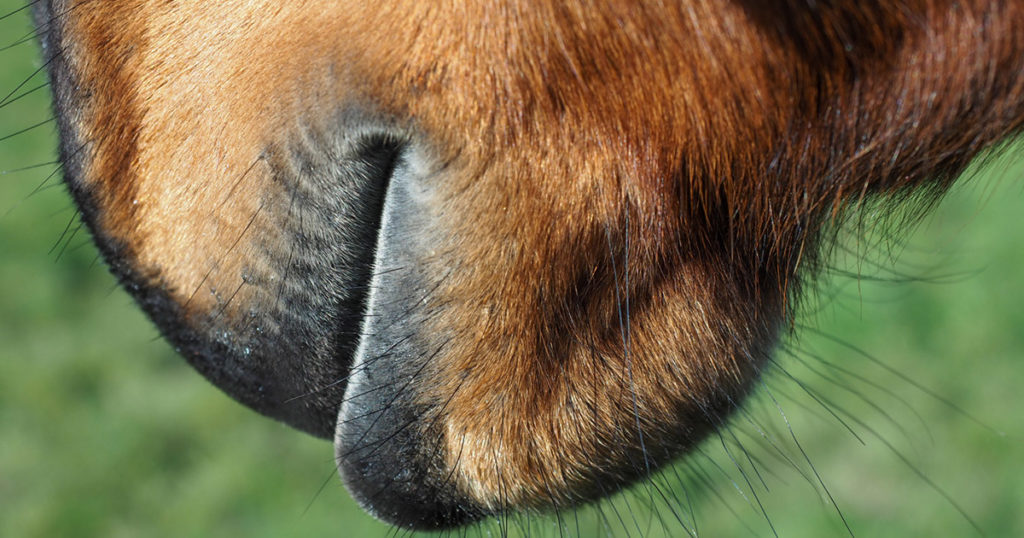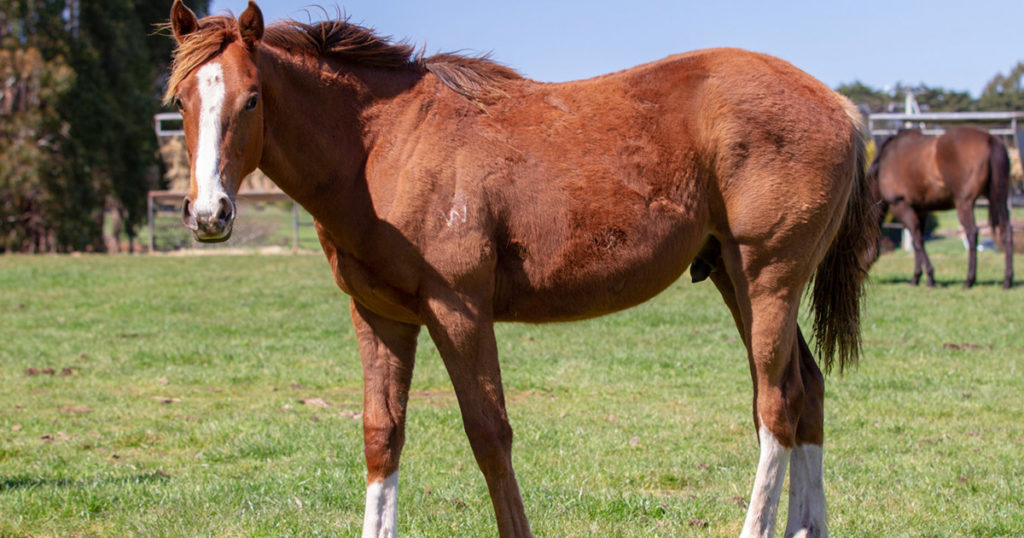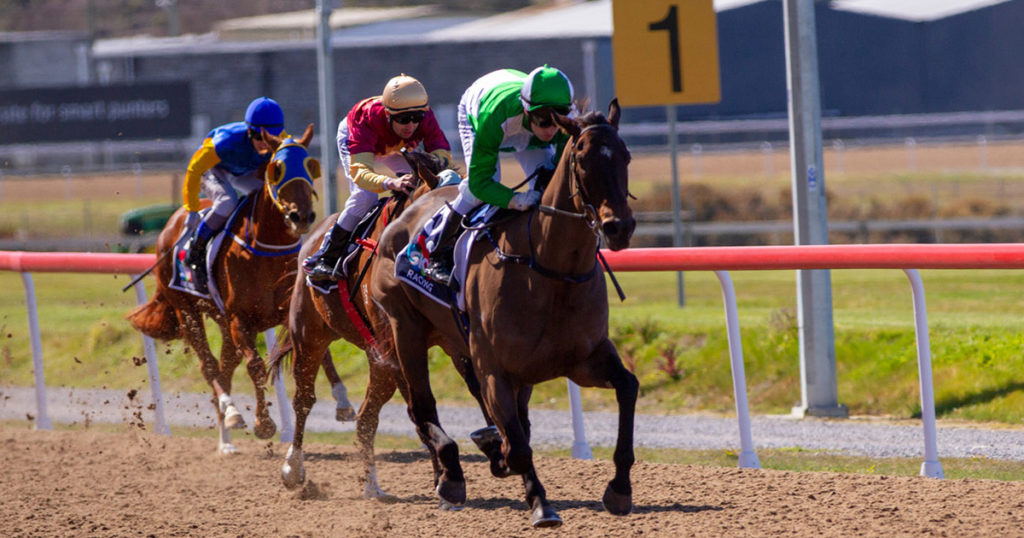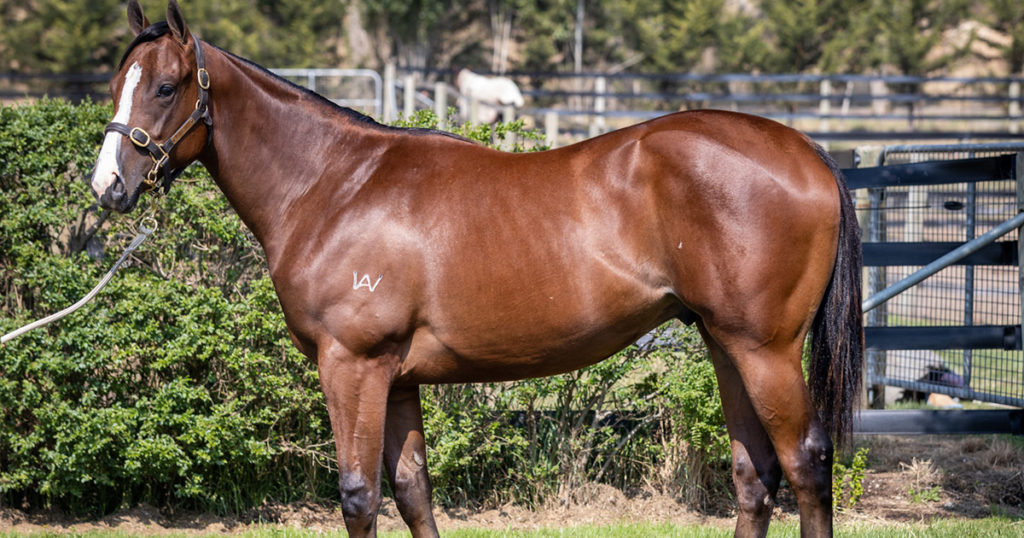Bad Breath in Horses
The smell of our horse’s breath isn’t something we generally give much thought to. Yet if you’ve ever smelt the breath of a horse or pony with halitosis (bad breath)- then it becomes something hard to ignore. So why do some horses and ponies have bad breath and is it something to be concerned about?
Many factors can contribute to bad breath in the horse or pony: the most common being bacterial overgrowth in the mouth, decreased saliva, dental plaque, periodontal disease, cracked teeth and tooth abscesses. Yet the causes of bad breath aren’t just limited to the mouth alone. Infection in the respiratory tract and poor digestion can all contribute to bad breath. The side effects of some medications may also contribute to halitosis.
Oral Contributors
Halitosis can arise due to a lack of saliva production. The major salivary gland in our horses, the parotid gland, only secretes saliva when a horse chews. When our horses or ponies go long periods of time without grazing or consuming fibrous feeds such as hay, there are significant periods of time when there is little saliva in the mouth. The horse fed one or two concentrated/hard feeds daily, with little hay or grazing in between producing much less saliva than nature intended them to. Saliva has a multitude of functions in relation to our horse’s health, one of these being important antimicrobial activity through naturally occurring antibodies it contains. Lack of saliva production due to lack of chewing creates the perfect breeding ground for high levels of specific bacteria to build up in our horses’ mouths. This results in malodour. The effect is compounded by feeds that are high in sugar and/or starch, which can further ‘feed’ these ‘bad’ bacteria. Furthermore, a dry mouth and lack of chewing fibrous feeds can also contribute to increased volumes of plaque on the teeth, giving rise to bad breath. Saliva helps rinse away tiny particles of food debris that may otherwise settle on the teeth and cause dental plaque. For more information on saliva and the importance of chewing in our horses visit the article: Why Basics Matter: The Importance of Chewing.
Gingivitis (gum inflammation) and periodontitis (where the inner layer of the gum and bone pull away from the teeth and cause pockets of air between the gums and teeth) affect horses in a similar way to humans. Gingivitis usually precedes periodontitis and begins when bacteria in the mouth proliferate around the teeth and gums. The build-up of large numbers of bacteria that attack the gingiva or gums leads to inflammation and malodour. It’s important to note that as the disease progresses and the gums become swollen and bleed, bacteria are able to enter a horse’s bloodstream and travel around the body. The effects of periodontal disease extend far beyond the mouth: it may be associated with reproductive problems in our horses and other undesirable conditions. Gum disease can contribute to loosened teeth, tooth loss and infections in the bone surrounding the teeth.
Poor Digestive Function
Hydrochloric acid (HCl) is an essential component of healthy digestion in our horses and ponies. It is produced by specialised cells in the stomach called parietal cells. One of the many functions of HCl is to help keep bad bacteria and opportunistic micro-organisms in check. When HCl production is reduced or shut down (as is the case with the use of ulcer medications) a perfect environment is created for opportunistic bacteria to flourish (for more information on the way ulcer medications work and their effects, visit the article: Ulcers in Horses: The importance of understanding how medications work). These bacteria produce compounds that result in a foul odour. Another crucial role of HCl is facilitating proper digestion and breakdown of food. Without sufficient HCl to help initiate normal digestion and maintain an acidic pH in the stomach, feed can ferment in the gut- resulting in the production of malodorous gasses. For these reasons, bad breath can be an indication to look at digestive health beyond the mouth.
Medication Side Effects
A wide variety of medications commonly used in horses and ponies may contribute to halitosis through differing mechanisms. Some antibiotics, anti-fungals, anti-histamines, diuretics, sedatives, bisphosphonates and dimethylsulfoxide (DMSO) may all cause or contribute to bad breath in equines.
Respiratory Tract Infections
Sinusitis (inflammation of the lining of one or more of the sinuses) and upper respiratory tract infections can also contribute to bad breath in our horses. These are generally accompanied by mucoid (whitish, yellowish) nasal discharge out of one or both nostrils. Clinical signs may also include swelling or bulging of the facial bones, decreased appetite, lethargy and weight loss.
Nutritional Deficiencies/Insufficiencies
Beyond the type of feed our horses consume and how frequently they are fed, many key nutrients play important roles in oral health. Insufficiencies and/or deficiencies in protein, vitamin A, vitamin D, zinc and impaired production of B group vitamins and vitamin C may all be implicated in compromised oral health, leading to bad breath.
Conclusion
There are many causes and contributing factors to bad breath in horses and ponies. Whilst poor dental and oral health are obvious cases of bad breath, diet, medications, gastrointestinal and respiratory system function may all play important roles. Foul smelling odours from the nostrils and/or mouth warrant further investigation by suitably qualified professionals. Properly identifying and addressing the cause(s) of halitosis help to promote overall health in your horse or pony, as well as helping them to have a non-offensive smelling breath!

Camilla Whishaw is a highly regarded, experienced horsewoman and naturopath, helping to holistically treat and manage a broad range of equine health conditions and injuries, with a passion for mare and stallion fertility.
As a world-renowned practitioner, presenter, author, and consultant in the field of Equine Naturopathy, Camilla shares her knowledge through keynote presentations, interviews, lectures, panel sessions, and workshop training.





